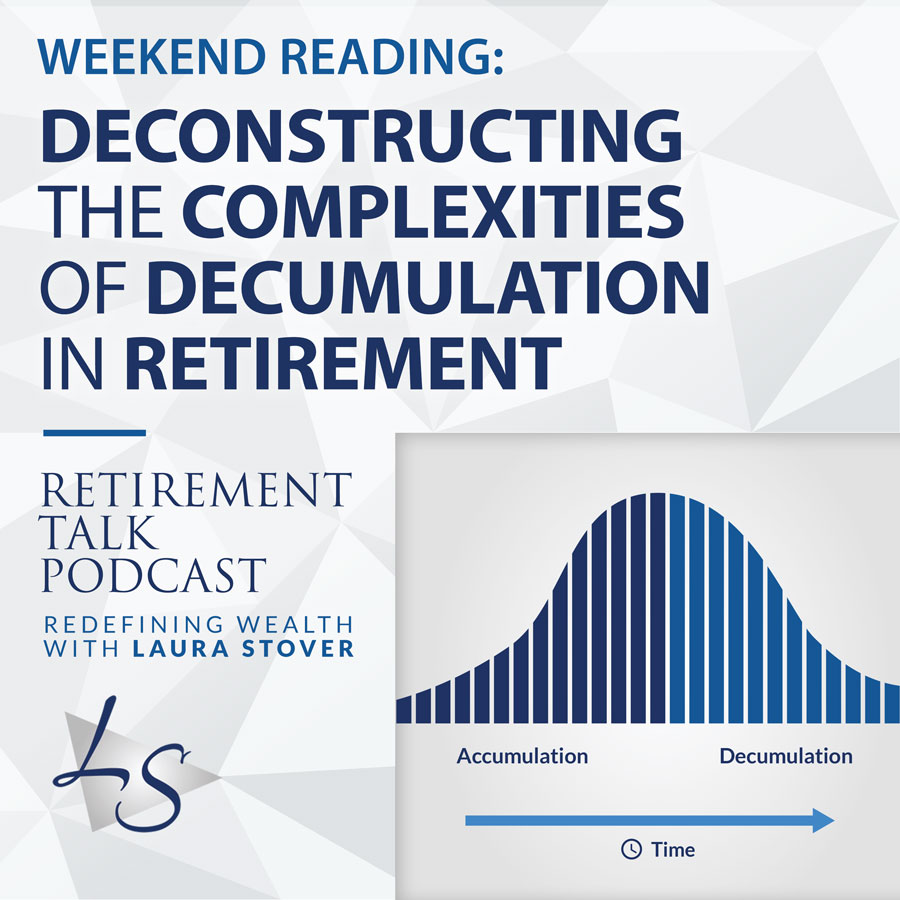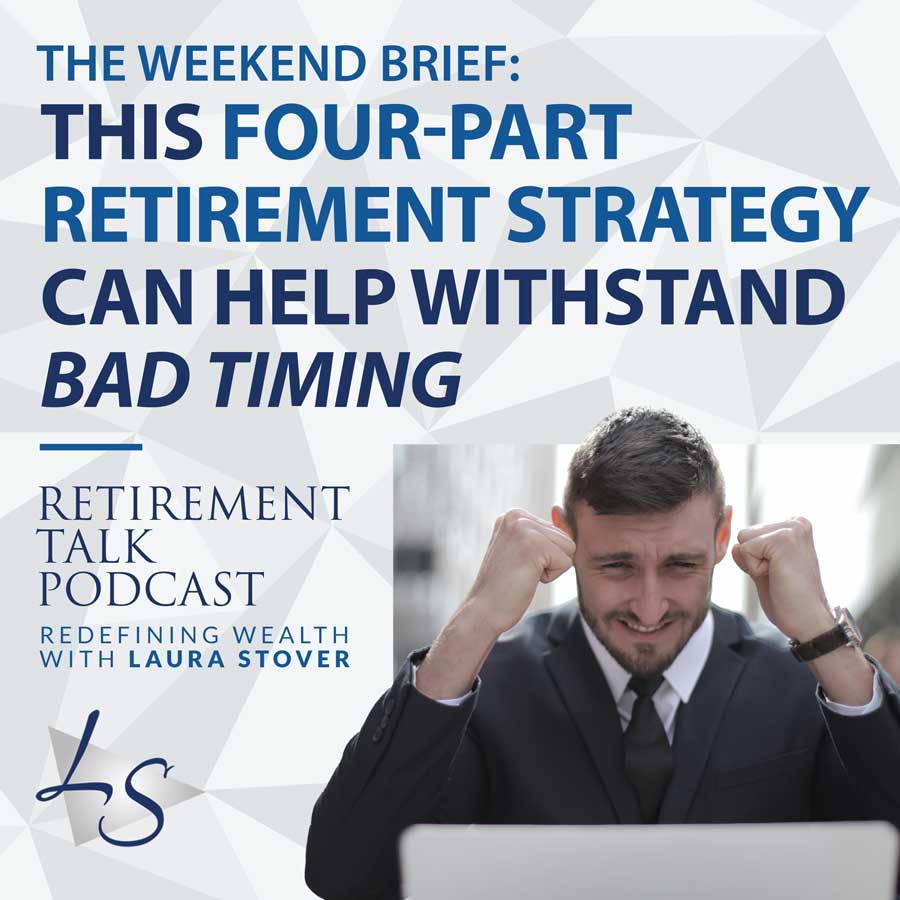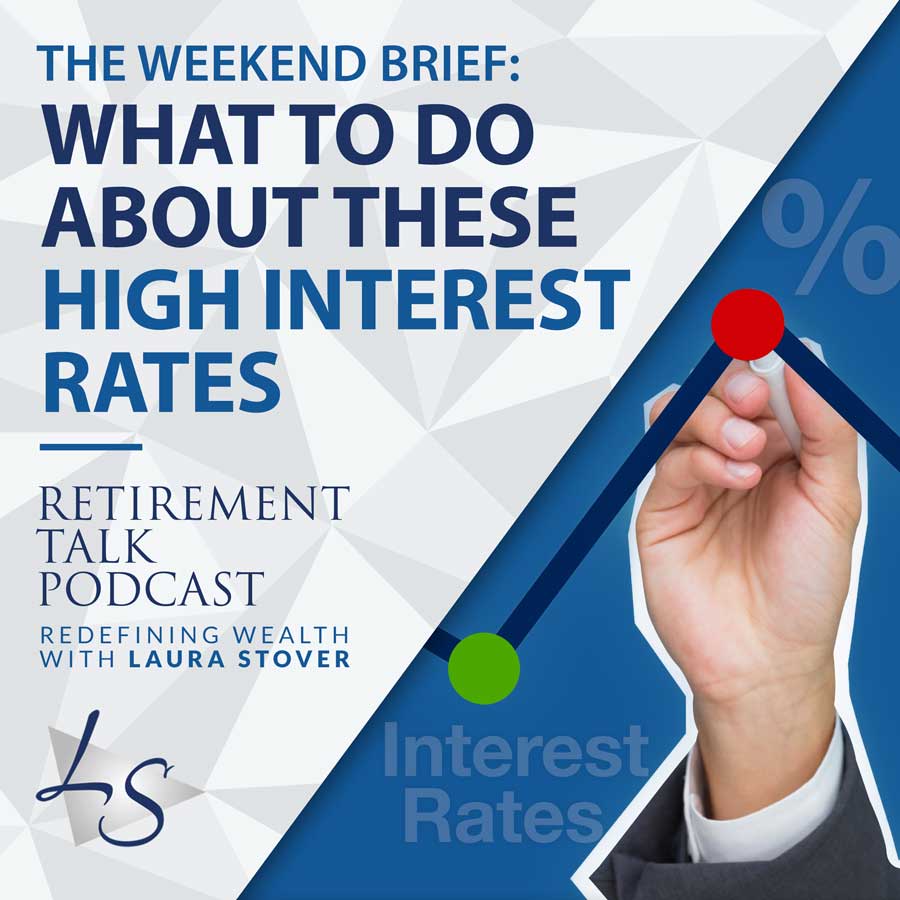While we don’t focus a lot of our time or conversations on decumulation, it’s definitely a topic we need to discuss. Decumulation in retirement is the approach you take to spend down or withdraw from your savings.
In this episode, we’re discussing why it’s important to have a written income plan for decumulation, a few misconceptions you may have about decumulation, and some interesting findings about investors by a new study from PIMCO!
Review the article mentioned in today’s show >>
Rate & Review the Podcast on your favorite podcast app!
Sign Up for The Weekend Reading Email to read more on the featured podcast: redefiningwealth.info/weekend-reading
Show Notes
Decumulation (2:06)
Parallels of Retirement & Mountain Climbing (3:10)
Your Legacy & Estate Plan (5:35)
Listener Story: Psychological Impact of Saving in Pre-Retirement without a Written Income Plan (7:25)
Client Story: Lack of Written Income Plan Leads to Working in Retirement (7:47)
Client Story: Adequate Assets but Level Income/Expenses (9:21)
Retirement & “Variable” Don’t Go Together (13:11)
Laura:
Decumulation: Decumulation is About Converting Your Traditional Savings Oriented Portfolio Into A Cash Flow Machine (16:05)
Look at the Plan (17:14)
Miscalculations (17:31)
- Missed Timing When You Retire
- Setting an Appropriate Spending Level
- Mistiming the Social Security Claiming Strategy
- Sequence of Risk
PIMCO’s Survey Results from Investors (19:42)
- 83% of the survey respondents said they’re confident or highly confident they’d meet their future needs
- 88% said they’re above average investors
- Most said they expect to live past the age of 90
- 20% of respondents in this research who said they don’t have a plan for how they’re going to generate income
- 55% of wealthy investors who participated in this survey had an unrealistic plan for withdrawing money from their savings
- 19% of respondents who said they didn’t have any plan
- One in three respondents were susceptible to that loss aversion bias
- 60% of PIMCO’s respondents said they’d be willing or very willing to cut back their retirement spending budget to accommodate those vagaries of the markets
- Those who didn’t prioritize a legacy goal for their retirement portfolio plan to spend down 67% of their total wealth, two thirds
- On the flip side, those who consider legacy planning as an essential priority, they intend to spend down just 35% of their wealth, about one third
The 4% Spending Rule (24:10)
It’s Not One Size Fits All (25:28)
Links:
Weekend Read: redefiningwealth.info/weekend-reading
Text TAX GUIDE to 474747
Text KNOWLEDGE to 474747
Listen & Subscribe
JAG:
Welcome to Retirement Talk the Redefining Wealth Show specifically for pre-retirees and retirees to help you better understand and navigate during these financial times. We’re here to discuss thoughts and ideas, FROM some of today’s foremost experts in the field of finance and retirement, as well as discuss trending topics that could impact your bottom line. These discussions can help you make better financial decisions and be informed so you can live the lifestyle you imagine and make better financial choices. Laura Stover is a registered financial consultant and CEO of LS Wealth Management, as well as founder and owner of LS Tax, a consulting firm. She’s been featured in Forbes, CNBC, and the Wall Street Journal. I’m Jon JAG Gay. Here’s your host for Retirement Talk Redefining Wealth. Laura Stover, welcome into the show.
Laura:
Hello, hello. I’m joined today by my good friend JAG for these special Friday editions of Retirement Talk, the Redefining Wealth Show and JAG is here with me today. Hopefully we have Michael back with us next week, some travels are an order. It’s a busy time of year. I know I’m jet setting again here soon for two business trips myself, and just came off of two trips.
JAG:
That’s not on the LS Wealth private jet, is it?
Laura:
Not yet, but I’ll let you know when we can give you a ride in that beautiful blue jet. So, hey, this is an opportunity for us to cover one of the four articles that I send out each and every Friday as part of our weekend reading for retirees, the email series. And this is one of four articles on trending topics in the retirement planning arena, all designed to help you make better decisions in retirement. And this article today comes from financial advisor.com also known as Financial Advisor magazine. It’s an industry magazine. I receive a copy of the magazine and the title is Deconstructing the Complexities of Decumulation. Decumulation, how about that word?
JAG:
Laura, we’ve all heard of accumulation. We talk about that a lot, but decumulation is kind of the opposite side of that, right?
Laura:
Yes, and it’s not something we focus on a lot. And there’s really many different ways that it’s said in terms of retirement income planning, decumulation or spend down or withdrawal percentage. It’s about planning for that distribution phase we’re all going to face once we retire. And so just to recap again, subscribe for free to the Weekend Read. You can read more on this article and the four that I send each and every Friday, just go to redefining wealth.info and subscribe for free.
JAG:
Often people don’t think about inflation, their sources of income in retirement, the income you’re going to need and require as those numbers are going to change throughout the course of time and your retirement. Dr. Wade Pfau, we’ve talked about him on the show before. He also speaks to the different retirement risks, such as spending shocks, unplanned expenditures. He lists seven key risk retirees will face, but it’s all about having income in retirement, as you say, not just assets.
Laura:
And I think, JAG, one of my favorite ways to think about this. I know you’re a venturous person and hopefully the foot is doing better this week, but mountain climbing, if you kind of parallel retirement with mountain climbing. You go out, you climb a mountain. You might say, “Boy, that’s really dangerous.” Mount Everest, a lot of people really say, “Hey, that’s on my bucket list.” But the thing that’s going to kill you the most when it’s mountain climbing, it’s not going up the mountain, right? The majority, the vast majority of deaths actually occur on the way down the mountain, right? So it’s a much more treacherous journey on the way down. And that is very similar to retirement. Now, one of the things, if you’d go mountain climbing, what’s the name of that person that usually goes with the group?
JAG:
The Sherpa.
Laura:
And a Sherpa is what? A guide, someone that knows the terrain, they’ve been there before. They have experience, right? And I kind of equate that to the role of the financial advisor when it comes to this topic. So yes, most people focus exclusively on save, save, save, save, save. And I think that’s what the article is focusing on. And they did some surveys. There’s a vast majority of individuals. And the research done around this article is really focusing on some of the complexities around decumulation, really those types of things and obstacles that you’re going to face during that spend down phase, that decumulation timeframe that you’re going to see.
Laura:
And that’s really around the last third of life for most people. And we hear that a lot from our clients. They’ll say, well, it’s really easy for me to get to retirement. I just save. I set up my 401k and every two weeks money just pumps in. Maybe I get an employer match. I’ve worked there for 35 years. I’ve been really diligent and prudent. And I find a lot of people really are. They’re very good at saving, but now it’s more challenging because I have to think about taxes. You should be anyhow. Withdrawal strategies. What percentage of my income will I require? And at what point will I require that? Where do I take the money from?
Laura:
We have to think. What’s my legacy going to be? What’s my estate plan, the tax diversification that we really need to embed in our retirement plan, the health care costs as a retiree. It’s all a little more complicated and look at health care alone. One of the largest expenses that we will face. I see people very stubbornly say, sometimes, I will take my chances. When the reality is 70% of us are going to require some type of health care. Fidelity has done studies. They do these every single year. The average couple age, 65 or older, they’re going to spend just shy of 300,000 out of pocket. And with the inflation that we’re starting to see a little bit now. I mean, that’s going to continue to rise each and every year. So if you’re age 65 or older, where was the last place, the last year in 2020, JAG, if you’re age 65 or older, where was the last place you wanted to be last year?
JAG:
I got to say a nursing home, right?
Laura:
Bingo. So would it now be important to have the funds and the independence and the ability to stay home as long as possible, and to have your independence and not be trapped in a nursing home when a pandemic comes around. So it’s intimidating. And I think this type of research has been going on honestly, 15 to 20 years.
Laura:
There was an article clear back, I want to say in the early 2010s, from Harvard. It pointed to the largest risk retirees are going to face today. And it was the shift from this mindset of all about growth to the mindset of income, from the mindset of accumulation to decumulation or cash flow. You really have to embrace a philosophical change. So I had a nice long call, a talk with a gentleman that listens to us. He’s been listening to the show for about six months, a long conversation with him.
Laura:
He’s in a different time zone and that’s the beautiful thing. I’m so privileged to be able to have the show. I know a lot of people have been listening because I see the reports on the show. So he’s been listening for about six months. He wants to retire in about six months. He’s done a fabulous job of saving, but as we got into the discussion, this is more of a focus on the psychological impact of that saving for many years. And it’s kind of ironic that people spend years preparing for retirement by saving. But then when they actually get to retirement, they’re afraid to spend what they’ve worked very hard to accumulate. And that’s probably because most people do not have what I refer to as a written income plan. No matter how much wealth you’ve accumulated, because of the expenditures, the risks that we’re all going to face, longevity, healthcare, the spending shock that Dr. Wade Pfau talks about in his book, death of a spouse, taxes, inflation, illness.
Laura:
You really run the risk of problems that when you just pull from assets with no spending plan, that can become a very serious issue. I spoke with another client, my staff did recently. They retired a few years ago and the advisor provided no income plan, no withdraw plan. She kept taking money out of the account. It was really dwindling down and the husband, he was kind of a couch potato. He really didn’t want to work, 70 plus years old. Well, he has to go and get a part-time job now. Saw another lady in a similar situation except her spouse couldn’t work. He had very poor health. His health is not great, and it’s also a great expense to their household income. And I also spoke with a client just yesterday. She’s been widowed for many, many years.
Laura:
She has very adequate assets, but her expenses and her cash flow are really at the same point. She has plenty of assets, but she has to have an income plan because if you have no income plan at some point, it’s really going to dwindle down your assets, no matter how much of a nest egg you may have accumulated. The gentleman I spoke with has listened to the show for about six months. I mean, he’s well over a million and a half in assets. So he’s got more than enough to retire and with his guaranteed sources of income. But he said last year during the 2020 34% correction, that the virus induced in a very short amount of time, even though the market has come back up, he lost about four or 500,000. He lost like 40% of the portfolio. That can’t happen when you are retired, because we know that takes a big bite out of the nest egg.
JAG:
If you look at the numbers out there, Laura, boomers and the silent generation control about 75% of the 1.7 trillion with a T dollars in total household wealth, the United States. And this is where most of the wealth is. And it’s going to transfer, either you’re going to need it for retirement or you’re going to transfer it to your heirs. So you got to have a good strategy for it.
Laura:
And as they say in the article, the financial service industry’s really been geared towards helping people save and putting a lot of good guard rails in place during those savings years, but not so much for the boomers or the silent generation. There’s been millions, if not billions, piled into technology and research regarding how to help people become better savers, a lot of time and focuses there. You can find all kinds of helpful tools online to get to that financial independence. But now how do we place a plan in place when you actually retire?
Laura:
There just hasn’t been a lot put into helping the individual spend down those dollars. And the article, there’s a strategist from PIMCO that kind of headed up all the research in the article. She talks a lot in the article about the guard rails that were put in place over the last 50 years for the savers, but not nearly as much guidance for the spenders and the likelihood of people’s misbehavior. It only rises in that decumulation phase. There’s a lack of guidance. You may be a very frugal type of individual, but you still have to have an income plan. And that’s why I created our trademarked redefining wealth process. That framework covers those five key areas we’re all going to face with the various risk, but it all starts and stops with a defined, written income plan.
JAG:
Absolutely. And PIMCO’s kind of known for the bond trading and being a fixed income company. They can show an awful lot of tax deferred accounts, retirement accounts. This generation baby boomers have been forced, almost forced to that saving into these tax deferred qualified accounts because unlike their parents, they don’t have those pensions to rely on.
Laura:
The article goes on to say the author regarding decumulation. It’s about how to most effectively convert a traditional savings orientated portfolio that you’ve had for many, many years into what is essentially that cashflow machine. I love that. A cash flow machine, you just turn it on.
JAG:
That’s what we need to know when we get to retirement is to turn on that cashflow machine and think about income. Think about getting those regular paychecks for the rest of your life that aren’t coming from an employer. And Laura, I liked that you’re a decumulation firm. Not all firms are. Many are accumulators, but very few are income-focused into retirement.
Laura:
And that’s where you have to do your due diligence. The gentleman I spoke with last night at great length, he’s interviewing a multitude of firms, and it’s a good thing that he’s doing that. I always encourage clients to do that. He told me that last night that he interviewed an advisor at a brokerage firm, a very large one in fact, that’s very well-known throughout the country. And right before the 2020 meltdown that occurred, they wanted to put him in a variable annuity. Now what about retirement and the word variable are not synonymous fluctuating varying. And he said it was three to 4% in cost and fees. Now had he invested 250,000 of his million dollar portfolio in that variable annuity and then we experienced the 34% correction at that point, plus 3.8% in fees, how backwards and upside down would that variable annuity have been.
Laura:
So he had good instinct not to do that, to do his due diligence, to take some time and continue to learn, educate oneself so that you’re not going backwards. I really don’t think retirement is synonymous with how well the market is is doing. It needs to be synonymous with a process as I’ve mentioned our redefining wealth process. And the article goes on to say, you have to have that predictable income each year over the course of your full retirement journey.
Laura:
As you said, it’s a paycheck replacement. And that’s how we have to get that mindset shift. Not all firms are focused on that distribution and income planning. There’s a lot of wirehouses, a lot of firms that are good with the accumulation side, growing, saving, investing, but the income planning is more of a niche. And you have to address the different risk that are out there and mitigate those, or have the guard rails in place with good cash flow as part of your strategy.
Laura:
That’s why it’s the foundation. Income planning is the foundation of everything that you do, that trademark process to address those five key planning areas, income, investment, volatility, healthcare. You want your tax addressed. The taxes are a big part of that and liquidity. So individuals that are afraid to retire, they’re going to just continue to work and work and work because they may not feel they have enough. And we find so many times individuals do have enough to retire, but they just haven’t sat down and systematically, found out if they have enough to retire or put together that plan.
Laura:
And it’s a feeling of it’s never enough. And you read all the time about the retirement crisis. You need a million dollars to retire. Maybe you need 5 million to retire, and you feel like you never have enough. That to me is just noise. You have to really sit down. You have to do the hard work. And the article goes on to say, decumulation is about how to most effectively convert a traditional savings orientated portfolio. Maybe you’ve had it for many, many years, but how do you convert that essentially into a cash flow machine?
JAG:
I love that again, that cashflow machine, you just turn it on. That’s really about income and that’s what we need to do when we get to retirement. Turn on that cashflow machine and think about income. Think about getting those regular paychecks for the rest of your life.
JAG:
We hope you’re enjoying Retirement Talk the Redefining Wealth show. If you’d like to learn more on our featured article for today, you can subscribe to the Weekend Read. Sign up for free, just go to redefining wealth.info and click on subscribe. The LS team wants you to make the best decisions you can for your financial future. Learn more about tax changes, text tax guide to 4 7 4 7 4 7. Again, text tax guide to 4 7 4 7 4 7. Position your portfolio for managing volatility better, understand where you are with your risk tolerance. Schedule a 15 minute strategy session, go to redefining wealth.info and click schedule. Now back to Retirement Talk with your host, Laura Stover.
Laura:
Look at the plan. Look at the plan. We had done many of those things that are discussed in the hour to go. If we’ve addressed them systematically, and I think that’s helping people tremendously. And some of those things that were outlined in the article as hazards. When it comes to that decumulation side, some of the things that people miscalculate are things like missed timing, when a person retires, setting an appropriate spending level, mistiming, the Social Security claiming strategy, or what about sequence of risk? The worst thing, if you need income from your portfolio, JAG, what if the market is down like it was in 2000, 2001, 2002, three years in a row. That can have a very negative impact on a person’s nest egg. So basically taking withdrawals when you shouldn’t take withdrawals, maybe the portfolio’s down, and maybe you’re panicking during a market downturn.
Laura:
Each one of these things can be addressed. And I think that’s why you have to meet with your financial planner. You have to make sure that you have a way of systematically addressing each one of these very real risk. And if you’re doing it yourself, you need to have a list of all of your concerns and put together a plan for each one of those. Otherwise, those concerns are going to keep you up at night. I don’t like insomnia. I’m sure you don’t either. That’s a terrible thing. Now I’m an early riser, but I don’t want to be up all night worrying.
Laura:
And the last thing you want to do is file for Social Security at the wrong time, or maybe taking a distribution from the wrong account at the wrong time. You have to understand those withdrawals, and working with a professional can help put a rock solid plan together. You shouldn’t have to have the mindset. Well, maybe I should. Maybe I need a little more here. I want to retire in the near term. Maybe I should be more aggressive. Maybe I should be more conservative. If you have a plan in place that systematically addresses all of these things, I think you’re literally going to sleep much better at night.
JAG:
Yeah, I think this is such a great conversation we’re having today, Laura, because more people need to have this conversation with their spouses, with their friends, but especially with their financial advisors, to really understand that these are risks. And as you age, some of these risks become even harder to control.
Laura:
The resulting survey involved roughly 750 wealthy investors who are either approaching retirement or already there. It covered four main areas that really gauged people’s confidence level about their retirement. 83% of the survey respondents said they’re confident or highly confident they’d meet their future needs. Another 88% said they’re above average investors. What’s above average investor? And most said they expect to live past the age of 90.
JAG:
The quote here is, “Confidence is what we want. It’s desirable as long as it’s justified.” That’s from Jennifer Gongola, PIMCO’s, Behavioral Science Research Manager. But overconfidence is the behemoth bias. It creeps into our lives many different ways, and you can see it here.
Laura:
That’s great. 88% of them said they were above average investors. That’s concerning because 90% of investors earned above average investors. 85% even wealthy investors are really a hundred percent. Most of them are not prepared for retirement. And PIMCO’s behavior science research that overconfidence is a behavioral bias. That’s very dangerous. Now I’ve probably spoken to a few people that think that way. I’m getting very good at identifying those cluster B personality disorders a little bit too. Not just in finance, but we do have real biases that people in terms of how they think about their money and risk aversion. And there is a number of biases and things that can really interfere with the decisions we make, but it included about 20% of respondents in this research who said they don’t have a plan for how they’re going to generate income. That is huge. They don’t have a plan for how they’re going to generate income, let alone how all of these other risks that I’ve mentioned over and over, how are they going to face those various risks that are going to come? How are you going to face those throughout retirement?
JAG:
So there might’ve been a significant part of these people that were confident or very confident that didn’t even have a plan in place whatsoever. She noted that 55% of wealthy investors who participated in this survey had an unrealistic plan for withdrawing money from their savings. That included 19% of respondents who said they didn’t have any plan. She said these people have a misalignment between their confidence level and reality, misalignment. That’s a very nice way to put it, particularly since the majority of survey participants believe that longevity is on their side.
Laura:
Another finding from the survey was that one in three respondents were susceptible to that loss aversion bias that I just mentioned, which means they’re more focused on avoiding loss than achieving gain. And she described loss aversion though the main research from PIMCO here as an emotional reaction to risks that can impact retirement related decision-making in various ways. So for example, it can make spending from a nest egg feel like a loss, even when the spending’s aimed at a retirement goal. PIMCO says loss averse investors struggle to weather temporary market downturns. So some people are more loss averse than others. And those who had regular sources of cashflow though, during this transition period to retirement had significantly lower levels of loss aversion. And that will happen at any stage of retirement. Having a consistent cashflow makes an investor much more confident.
JAG:
Laura, elsewhere, the survey examined how investors prioritize risk. Health and market risks top the charts among soon to be retirees and those already in retirement. But 60% of PIMCO’s respondents said they’d be willing or very willing to cut back their retirement spending budget to accommodate those vagaries of the markets. The survey’s final focus area was legacy planning. It found that those who didn’t prioritize a legacy goal for their retirement portfolio plan to spend down 67% of their total wealth, two thirds. On the flip side, those who consider legacy planning as an essential priority, they intend to spend down just 35% of their wealth, about one third. The PIMCO duo concluded that managing people through their retirement years isn’t just a numbers game. Rather it requires input from the field of behavioral science. We’ve talked about this before. Things like the 4% spending rule can’t solve for the complexity of the market on its face. The 4% rule is pretty straight forward with retirees withdraw 4% of their portfolio value every year and avoid the risk of outliving their money. Right?
Laura:
The rule is based on academic research of investment returns over several decades. It incorporates those annual returns, compounding and dividends. And investors can also adapt their withdrawals to account for, but there’s problems with the rule. It’s been debated in recent years. It was developed in the 1990s. And does that 4% rule still hold true in today’s market? It’s undergone several steep downturns in the past 26 years. That buy and hold approach, it’s really an outdated approach. We’ve never felt that the standard 4% withdraw rule was particularly relevant.
Laura:
Many people have looked at this, and each person’s situation’s unique in terms of their assets of course their income and expenditures, nevermind the life expectancy. You don’t know how long you’re going to live and what your goals are. So you have to layer varying market environments on top of this. And it’s overly simplistic to calculate one percentage that applies as a whole to everyone.
Laura:
It’s not a one size fits all. And retirees are absolutely living longer. Many Americans go into retirement without any sense of how long their money’s going to last and how much they can safely spend. So having the decumulation phase of your life looked at, working with a firm, not every firm, most are about growth. Working if you’re a pre-retiree or retiree to have that written income plan and a specialization in addressing all of these facets, because that 4% rule does not necessarily apply in every single situation.
Laura:
Thank you for listening today. Hope you found the information helpful as well as insightful. Both the LS team and I strive to provide you with the very best resources from LS Wealth to help you establish the framework necessary to sustain and obtain your retirement. I want to offer you a complimentary redefining wealth strategy review. This will look at your entire financial and retirement plan.
Laura:
We want to make sure you have the proper balance and the plan that you need in place to address changes that will occur throughout your retirement and the different risk that you’ll likely face. We’ll provide a virtual, phone or in person session where you can be confident of your financial plan. Simply go to redefining wealth.info. Click schedule review. This’ll be a deep dive with your particular situation and your top concerns. There are many pitfalls you could be unaware of. We’ll show you how your choices can impact your life. Text knowledge 2 4 7 4 7 4 7. That’s knowledge 4 7 4 7 4 7, or go to redefiningwealth.info, click review.
JAG:
For more information on today’s show, go to redefining wealth.info and for show notes. You can also subscribe for free to the Weekend Read to learn more about today’s episode. When you subscribe you’ll receive four articles each and every Friday, straight to your inbox, with the most important articles during these financial times. This free subscription will provide you with valuable retirement information, as well as trending topics along with Laura’s breakdown in what you need to know about each topic. Sign up now for the Weekend Read. Go to redefining wealth.info. Click on Weekend Read. Redefining Wealth is a registered trademark of LS Wealth Management. Investing involves risk, including the potential loss of principal. Any references to protection, safety, or lifetime income, generally refer to fixed insurance products, never securities or investments. Insurance guarantees are backed by the financial strength and claims paying abilities of the issuing carrier.
JAG:
This show is intended for informational purposes only. It is not intended to be used as the sole basis for financial decisions, nor should it be construed as advice designed to meet the particular needs of an individual situation. LS Management LLC is not for to offer and no statement made during this show shall constitute tax or legal advice.
JAG:
The firm is not affiliated with or endorsed by the US government or any governmental agency. The information and opinions contained herein provided by third parties have been obtained from sources believed to be reliable, but accuracy and completeness cannot be guaranteed by LS Wealth Management, LLC. Investment advisory services offered through optimized advisory services and SCC registered investment advisor, LS Wealth Management is a separate entity.












